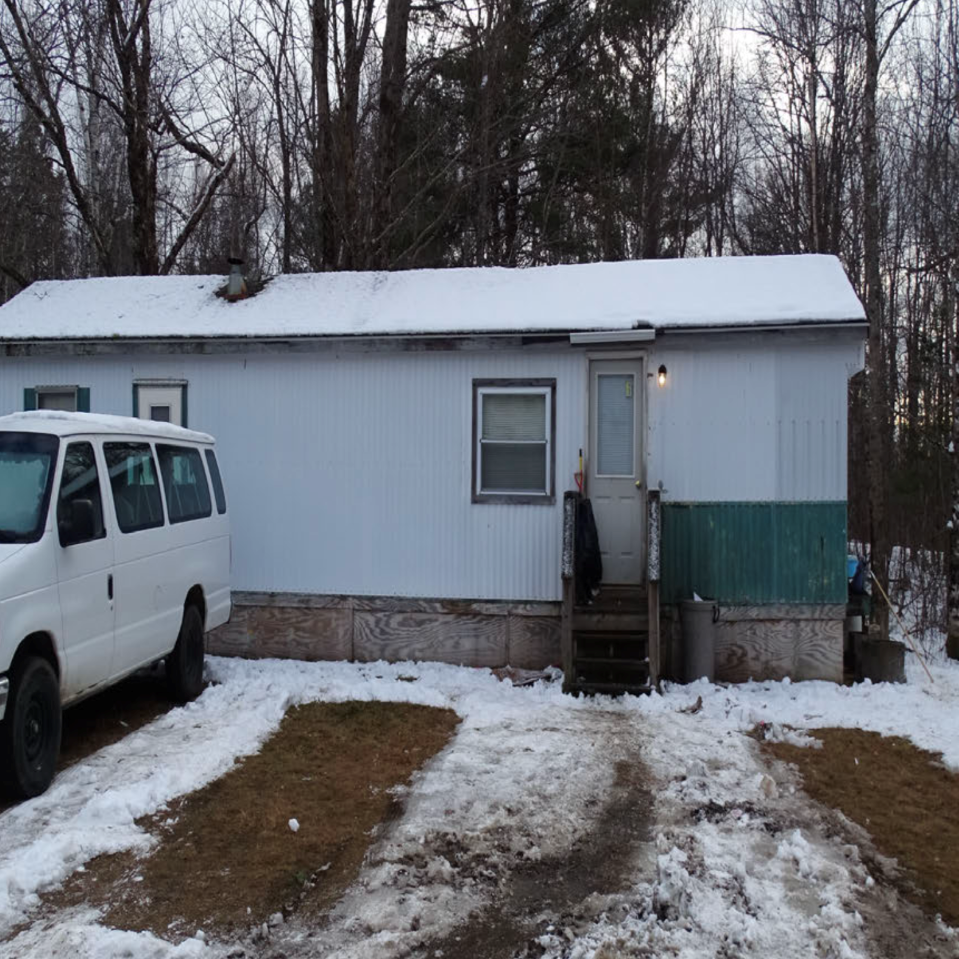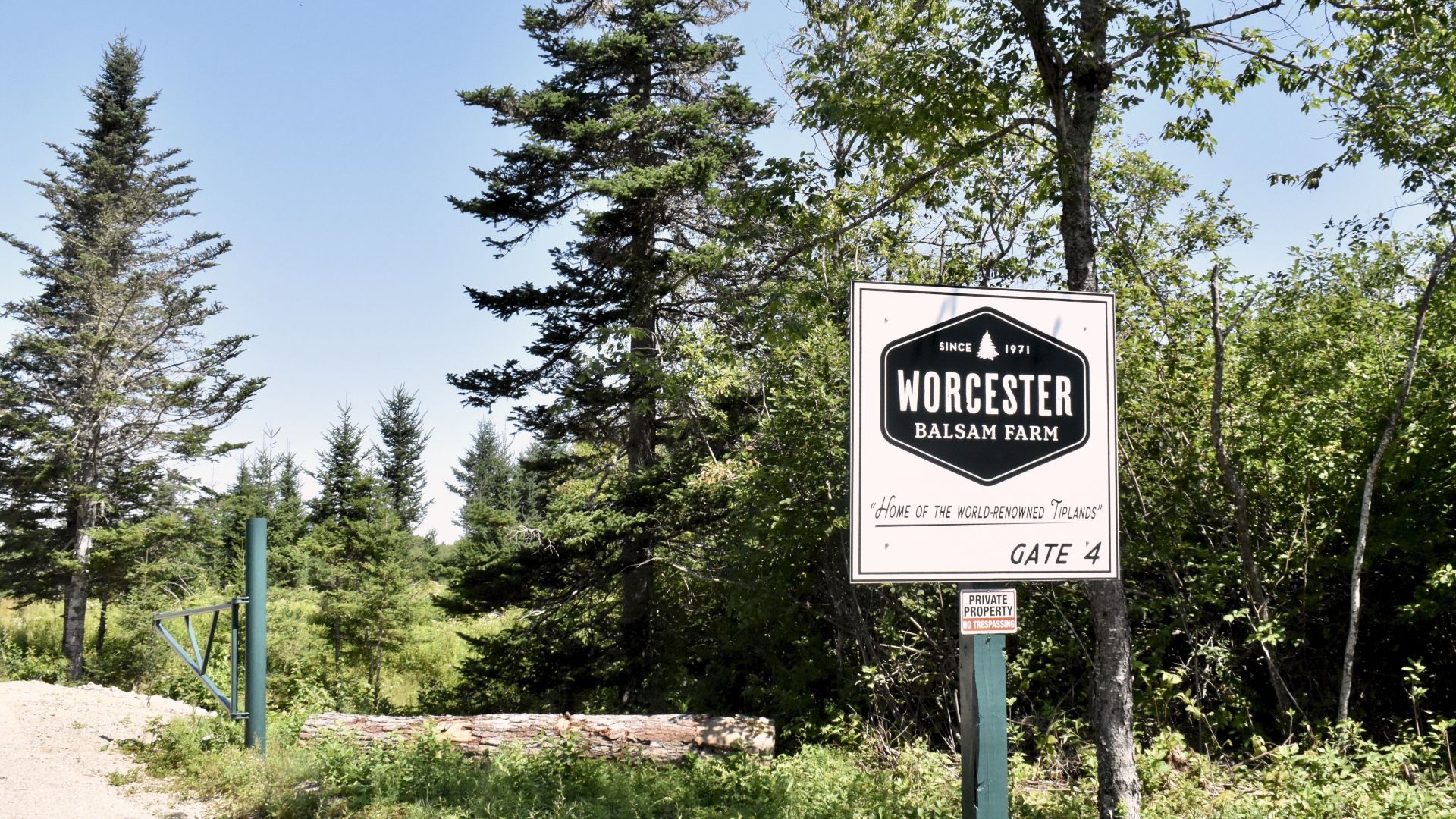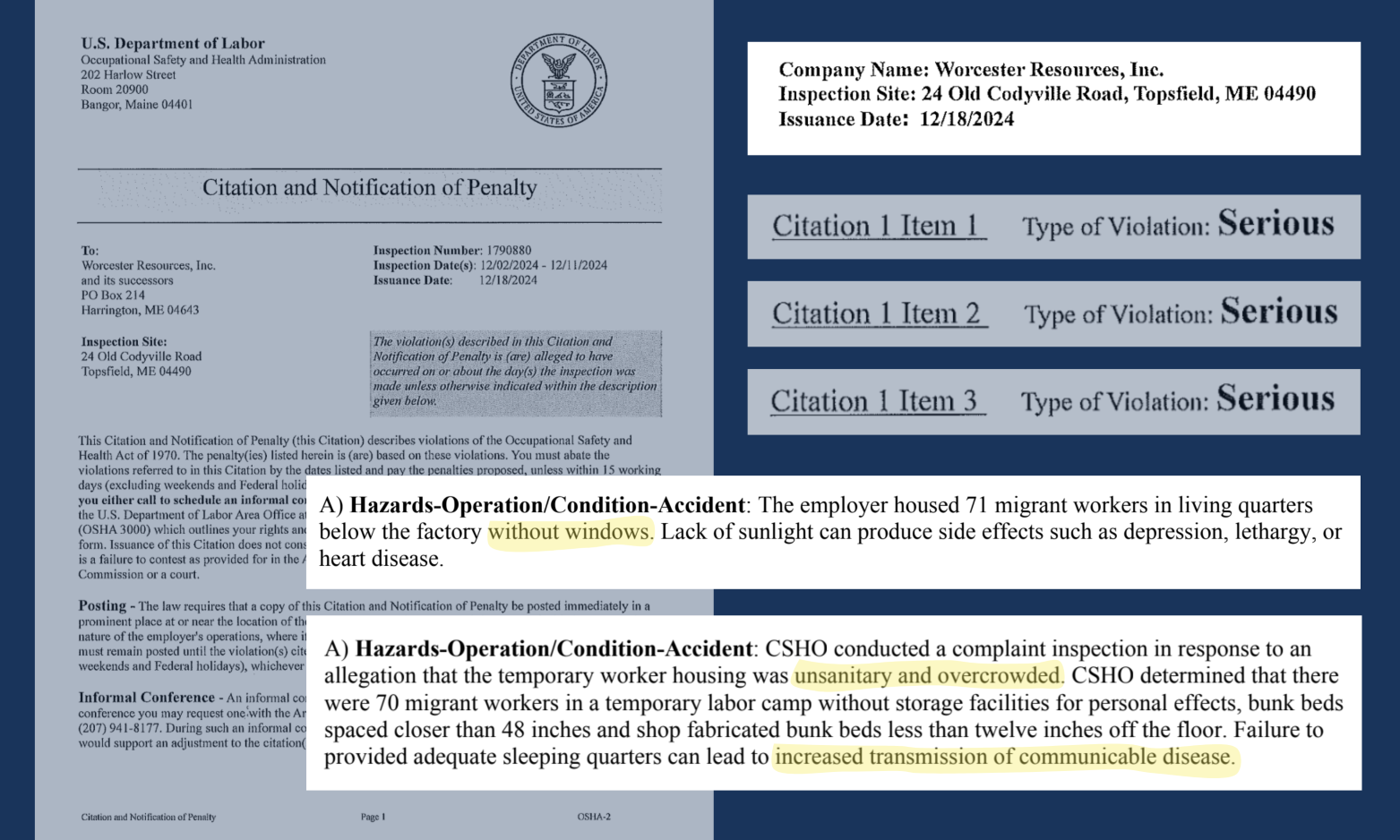The Maine Department of Labor contacted its federal counterpart last fall with concerns about the living conditions of workers at Worcester Resources, the family-owned Washington County company that supplies wreaths for the nonprofit Wreaths Across America.
There were allegations that Worcester Resources was housing migrant laborers beneath the factory floor of its wreath-assembly facility in Topsfield, where smoke detectors weren’t functioning and debris was falling into the kitchen and sleeping quarters, according to documents obtained by The Maine Monitor.
Next door, thirty additional workers were allegedly living in two small, unsanitary bungalows, without access to potable water, according to federal records describing the complaint.
The alleged housing abuses were reported to the U.S. Occupational Safety and Health Administration on Nov. 5, 2024. After a federal inspection, the company was cited for three “serious” violations and ultimately fined nearly $16,000.
This isn’t the first time that the for-profit company has been flagged for labor violations. Over the past four years, Worcester Resources has racked up more than $50,000 in federal fines, according to OSHA data, including for violations related to a COVID-19 outbreak that spread among 80 workers and left one employee dead.
Cramped living quarters
The weeks before Christmas are the busiest for the Washington County wreath-maker, as the company’s mostly migrant workforce races to lash together enough fir boughs in time to supply its nonprofit partner with the thousands of festive arrangements it places at graves at Arlington National Cemetery and other military burial grounds across the country.
It was during this seasonal sprint that the state referred the issue to OSHA, seemingly based on a complaint — the federal records outline several concerns but don’t specify their source, and the state agency has declined to clarify. The Maine Monitor filed multiple Freedom of Access Act requests with the state Department of Labor for records but they were denied under state confidentiality rules.
“Due to confidentiality, MDOL cannot confirm, deny, or comment on complaints, or lack thereof,” wrote Jessica Picard, communications director for the state Department of Labor. “Any information received would be confidential under section 3. Referrals to other agencies can happen in a variety of ways, including stemming from complaints, inspections, other types of visits, etc.”
While “reports of final bureau action” taken by the state Department of Labor are public record, the department said referral to OSHA does not qualify.
The Maine Monitor was able to glean some details of what the state flagged for OSHA through the federal agency’s reports: in addition to the lack of functioning smoke detectors and lack of potable water in the bungalows, the complaint alleged that the outhouses and bungalows were “very unsanitary.”
When an OSHA inspector visited the Worcester Resources facilities a month after the state referral, on Dec. 2, the agency found that the company was housing 71 laborers on the lower level of the factory and in two exterior trailers, and that “none of the sleeping quarters met the spacing requirements.”
Workers had an average of 30 square feet per person in their sleeping quarters — a little bit more than the size of a double mattress — and some slept in bunk beds that were just inches from the ground, according to the OSHA report. The agency requires that occupants of temporary labor camps be given at least 50 square feet of floor space and that beds be at least a foot off the ground.

The report also noted that the company “did not provide any furniture or storage areas in any of the living quarters” and that “the factory does not have any windows.” OSHA regulations state that windows should account for 10 percent of the floor area.
While the OSHA report noted that no Worcester Resources employees were sick at the time of the inspection, it warned that the conditions could impact their health.
“Lack of sunlight can produce side effects such as depression, lethargy, or heart disease,” the OSHA report stated.
The federal inspector could not substantiate the state referral’s claims that laborers were living in unsanitary conditions, and stated that their living quarters had functioning smoke detectors, access to potable well water and adequate bathroom, laundry and shower facilities, noting, “Overall sanitation of the quarters inspected was acceptable.”
The state referral, according to the OSHA report, also indicated that “employees are fearful of relations [sic], therefore they are not speaking,” but the OSHA inspector “was unable to validate this allegation.”
In December, OSHA cited Worcester Resources for three “serious” violations: inadequate floor space; rooms where bunk beds were packed too closely together and too close to the ground, without suitable storage facilities; and lack of windows. OSHA fined the company $7,604 per violation, $22,812 in total. In January, Worcester Resources was able to negotiate those fines down to $15,968 in an informal settlement, agreeing to correct the violations.

In response to questions from The Maine Monitor, an official with Worcester Resources refuted the allegations in the state referral, claiming that the complaint stemmed from a neighbor and that the OSHA inspector “found all the complaints to be unfounded and erroneous.”
“The workers were very content and happy with the housing and work conditions provided by the company,” wrote Rick Davis, the company’s operations and compliance manager. “Ample space was provided to workers for the size of the crew, but by choice they decided to congregate in the quarters on the first floor of the factory out of convenience.”
Davis conceded that the first floor of the factory lacked windows but said it had “two means of emergency egress” and stated that the company would resolve the concerns before the fall wreath season.
“This company has taken great pride in its protection of the workers and their quality of life while they are here,” Davis wrote. “We strive to do better all the time.”
The company has plans to expand its temporary worker living quarters beyond what it provides at its Topsfield facility. In late 2024, Worcester Resources purchased a 65,000-square-foot former mill building in Eastport, the Quoddy Tides reported last October.
Before the company can take on the 40 to 45 migrant workers it plans to house in the facility’s former office space, however, the town will have to rezone the eight-acre parcel the mill building sits on from industrial use to housing.
Rob Worcester, co-owner of Worcester Resources and son of founder Morrill Worcester, told the Quoddy Tides that the company may also retrofit part of the building for wreath-making, further expanding production.
Past labor infractions
The company’s history of labor violations led OSHA to inflate each of Worcester Resources’ three December fines by 10 percent.
“Employer has been inspected 5 time(s) by OSHA in the preceding 5 years resulting in two willful-other citations,” the OSHA report stated.
Between 2017 and 2019, the company was fined around $10,000 for repeatedly failing to file employee illness and injury reports required by OSHA. The company then missed a deadline to pay the 2019 penalties on time, federal records show.
Three years later, Worcester Resources again neglected to file the mandatory injury reports, this time during the COVID-19 outbreak among the company’s migrant laborers.
A Maine Department of Labor employee had harsh words for the company’s handling of the outbreak, records obtained by The Monitor in 2023 show, and described troubling housing conditions.
Workers “staying in temporary worker housing owned and provided by Worcester Resources… are essentially living in a Covid petri dish, in constant contamination through on-going close contact,” the state employee wrote in an email to OSHA in 2021.
Worcester contested the $11,500 fine that OSHA levied for failure to report the employee’s death from COVID-19 and other labor violations. On an OSHA mediation form, the company claimed that it wasn’t “certain” that the COVID-19 death was work-related and that company officials thought that the state agencies it was communicating with had reported the event to OSHA.
“We will not pay more than $10,000 in fines because we are a seasonal business, and we have entered the slow season,” the company wrote.
The sons of Wreaths Across America and Worcester Resources founder Morrill Worcester, Mike and Rob Worcester, told The Monitor at the time that the company has “a low violation percentage” when stacked up against bigger employers.
Compared to other financial penalties OSHA levied on Maine businesses in 2024, the fines that Worcester Resources received were relatively small. Twenty businesses were each fined more than $40,000 that year for a variety of workplace injuries and improper safety procedures, OSHA records show.

At the end of the 2023 fiscal year, Wreaths Across America had $40 million in revenue, tax filings show, and $41 million in expenses for the nonprofit’s widespread efforts to honor veterans’ military service with both wreaths and patriotic programs, like the Mobile Education Exhibit that the nonprofit totes across the country by tractor trailer.
A majority of that money goes to Worcester Resources, which supplies Wreaths Across America its balsam products and flags at a price of $27.6 million, according to the nonprofit’s 2023 tax filings.
Wreaths Across America’s executive director is Karen Worcester, wife of Worcester Resources president Morrill Worcester. The arrangement between the two organizations, in which the nonprofit collects donations to sponsor wreaths, and much of that money is then passed along to the for-profit wreath supplier, has drawn scrutiny. But the nonprofit has said it selected Worcester Resources through a bidding process.
Worcester Resources drew even more headlines in 2023, when the company proposed building a billion-dollar, 2,500-acre Flagpole of Freedom theme park in the small Downeast hamlet of Columbia Falls.
The park’s namesake flagpole would have towered 1,776 feet above sea level — taller than the Empire State Building — emerging from an undeveloped tract of woods on the outskirts of town.
Many of the town’s 500 residents immediately scrutinized the project and its massive footprint. The town lacked the ordinances and planning expertise to effectively permit it and, after residents approved a moratorium on large-scale developments to draft those ordinances, the Worcesters dropped the project. The company also agreed to pay a $250,000 fine for constructing cabins without proper permitting.
Precarious times
According to OSHA documents the 70 migrant laborers that Worcester Resources employed at the time of the violations last year were in Maine on H-2A temporary work visas, a U.S. program that allows foreign nationals to come to the country for seasonal agricultural work.
Nicolaas Groeneveld-Meijer, an attorney for Pine Tree Legal Assistance’s Farmworker Unit, told The Maine Monitor that he and some colleagues from the legal aid nonprofit visited the Worcester facility to pass out legal resources to migrant laborers last November and witnessed some of the same conditions that the state referral described. He said he heard workers mention fir needles falling into the kitchen and living quarters on the factory’s lower floor, but that they did not complain about the living conditions or their employer.
The state referral noted that laborers were hesitant to talk out of fear of retaliation. As the Trump administration intensifies its crackdown on immigration, Maine immigrant rights groups warn that this climate is only getting worse, and that immigrant workers could be especially hesitant to report labor violations out of fear of deportation or retribution.
The U.S. Border Patrol has conducted sweeps across Maine this year, and in a recent operation arrested 39 people from Houlton to Augusta who the agency claims were undocumented. Some businesses have raised concerns that workers here on seasonal agricultural visas could also be at risk, and that the overall climate is one of fear.
“Coming forward and reporting abuse and violations of rights as an immigrant worker is an incredibly difficult decision and an act of courage,” said Alice Kopij, co-legal director for the Immigrant Legal Advocacy Project in Maine. “People may face unsafe working and living conditions, wage theft, exhaustive hours without breaks, threats of being reported to ICE, and much more.”







